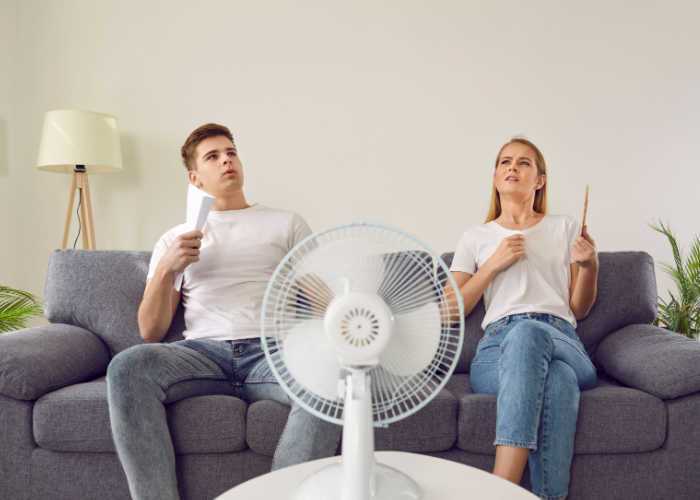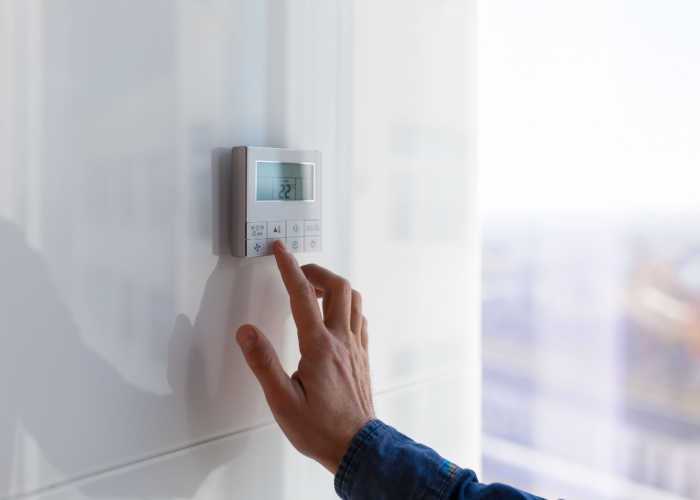As the temperature rises during the hot summer months, a properly functioning air conditioning system offers respite in a cool, inviting environment. However, AC units can encounter various issues that hinder their performance, leaving homeowners frustrated and uncomfortable.
Fortunately, many common AC problems can be addressed with some troubleshooting tips and advice. In this post we look at some common air conditioning problems, providing practical solutions for minor issues and guidance on when to seek professional help.

One of the most common problems homeowners face with their AC systems is inadequate cooling. If you find your home is not reaching the desired temperature, several factors might be contributing to the issue.
Some possible causes include dirty or clogged air filters, refrigerant leaks, or an improperly sized AC unit.
To troubleshoot inadequate cooling, start by checking and cleaning your air filters regularly, as dirty filters restrict airflow, reducing the system's efficiency. Additionally, check that your thermostat settings are correct and ensure there are no obstructions around the vents. Clearing debris from the outdoor unit - such as leaves or dirt - can also improve its performance.
If you’re concerned about a refrigerant leak, or suspect your AC unit is undersized for your home, it's advisable to consult with a professional HVAC technician for a thorough inspection and appropriate recommendations.
Unusual noises coming from your AC unit can be quite disconcerting. However, they often indicate specific issues that can be resolved with proper troubleshooting.
Rattling or vibrating sounds may suggest loose screws or fasteners, and simply tightening them can eliminate the noise. Grinding or squealing noises may indicate a lack of lubrication in the moving parts. Applying lubricant to these components can help reduce the noise and prevent further damage.
If you hear banging or clanking sounds, it could be a sign of a more serious problem, such as a faulty compressor or loose internal components. In such cases, it’s recommended to schedule a professional domestic air conditioning service to avoid further damage or breakdown.
Poor airflow is another common issue that can impact the efficiency of your AC system. Several factors can contribute to this problem, including blocked or dirty air vents, clogged or obstructed ductwork in a central system, or a damaged or malfunctioning blower motor.
To troubleshoot airflow problems, start by clearing any blockages from the air vents and ensure they’re not obstructed by furniture or other objects. If you have a central system, regularly inspect and clean your ductwork to remove dust, debris, or mould that may restrict airflow. Replacing air filters on a regular basis is crucial, as clogged filters can significantly impede the movement of air.
If you suspect a problem with the blower motor it’s best to call in a professional engineer to test and replace it if necessary.
AC systems use refrigerant as a heat transfer medium, and if left unaddressed a refrigerant leak can lead to inadequate cooling, reduced system efficiency, and potential damage to the AC unit.
Signs of a refrigerant leak include diminished cooling performance, ice buildup on the evaporator coil, or hissing sounds near the indoor unit.
When dealing with a refrigerant leak, it’s essential to involve a professional HVAC technician who is certified as an F-Gas engineer. F-Gas certification ensures that the engineer has the necessary training and qualifications to handle refrigerants safely and responsibly.
Attempting to fix a refrigerant leak without the expertise of an F-Gas certified engineer can be hazardous and may result in further damage to the system.

Thermostat issues are another common problem that homeowners may encounter with their air conditioning systems. The thermostat acts as the control centre, regulating the temperature and controlling the operation of the AC unit, and malfunctioning thermostats can result in inaccurate temperature readings, erratic cooling cycles, or failure to turn on/off the system as intended.
To troubleshoot thermostat issues, start by checking the settings to ensure they’re correctly configured for your desired temperature and cooling mode. Replace the batteries if necessary, as a low battery can cause erratic behaviour.
Clean the thermostat and its surrounding area to remove any dust or debris that may affect its functionality, and if you have a smart thermostat, ensure that it’s properly set up and connected to the Wi-Fi network for optimal performance.
If the problem persists, consider recalibrating the thermostat or replacing it with a new one.
While troubleshooting minor AC problems can be helpful, there are situations when it’s best to seek professional advice. If you experience frequent or recurring issues with your AC system, it's a clear indication there may be underlying problems that require expert attention. Persistent electrical problems, short circuits, or complete system failure are all signs that warrant professional assistance.
Hiring a professional HVAC technician offers several benefits. They possess the expertise and specialised equipment to diagnose complex issues accurately, and their timely intervention can prevent further damage. Additionally, professional repairs and maintenance can lead to long term cost savings by improving energy efficiency and extending the lifespan of your AC unit.
At Loughborough Air Conditioning we provide regular maintenance packages and emergency call out and repair for customers across the East Midlands. Our engineers are F-Gas certified and we’re members of the Government endorsed TrustMark scheme, assuring you of our commitment to excellent customer service, technical competence and trading practices.
